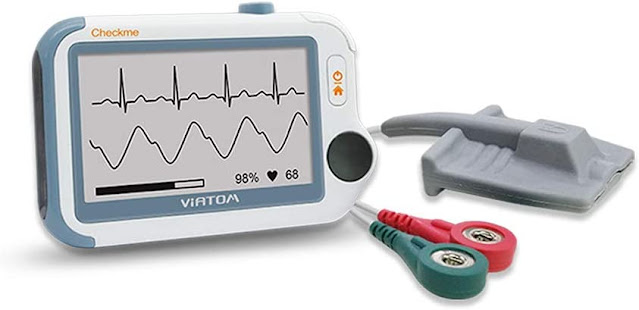Can ECG Test Be Done At Home?
Electrocardiogram (ECG or EKG) is a non-invasive medical test designed to detect any heart problems by monitoring the activity of the heart during the cardiac cycle. In the testing COVID 19 phase, when technology was pushed to extreme tests to get everything delivered at the comfort of your home, is it viable to ask, “Can ECG be done at home?”
Then, the answer is an emphatic “Yes”. Now, the question that arises is how to choose the correct ECG monitor most suited for use at home and what features one should focus on while choosing one for home.
What Is An ECG Monitor?
An ECG monitor is a portable device to measure and records heart rate and rhythm and then displays the electric signals received from the heart in a wave-like pattern. Some monitors have advanced features like blood pressure monitoring. Instead of those sticky electrodes that are stuck on your body, these devices work on the inbuilt sensors. The sensors pick up and read the electrical activity of the heart. Some ECG monitors are connected to your mobile via Bluetooth. This gives you access to your reports on your smartphone, which you can share with your doctor for consultation.
When Is ECG Done?
There is a sudden surge in the need for ECG, due to increasing cases of high blood pressure, anxiety, and other heart-related problems. It is mostly done when a person complains of chest pain, throbbing, dizziness, excessive fatigue, and short breath.
It is also done before any surgery when the patient has had any heart-related problem in past. Also done post heart surgery to assess the overall heart health and mitigate risk. ECG is also done after the implanting of a pacemaker or to check how the body is responding to the heart medicines.
How Is ECG Done?
In clinics or hospitals, ECG is done by connecting several small, sticky sensors called electrodes to your arms, legs, and chest. Electrodes are connected to the ECG machine through wires to record the electrical signals received from the heart. This test is advised by the doctor to check the condition of the heart.
The doctor studies the rhythm of the heart’s rhythm, strength, and timing of the electric impulses as they travel through different parts of the body using the readings.
What Can An ECG Detect?
An ECG gives you the warning signals for the following heart problems:
- Arrhythmias: A heart condition when the heartbeat is not rhythmic. When the heart beats too fast, the condition is called tachycardia and when it beats too slowly, it's known as bradycardia.
- Coronary Heart Disease- When the fat in your body interrupts the supply of blood to the heart by damaging the blood vessels. This condition leads to the narrowing of coronary arteries impeding the blood flow to the heart.
- Cardiomyopathy-This heart disease acquired or inherited, leads to thickening heart walls. In such conditions, it becomes difficult for the heart to pump blood and may even lead to heart failure.
How Do I Choose An ECG Monitor?
There are several factors to take care of while choosing the right ECG device for your home.
- Cost of The Device- It is not advisable to buy a very expensive device. The report generated gives you a tentative idea of the wellness of your heart. They work the best for you if a have a regularly visiting medical professional.
- Battery Backup- Before making your final choice, also consider the battery life as one of the factors. A device with long battery life enhances its utility and efficiency to a considerable extent.
- Good Storage Capacity- You may compromise on the looks but not the storage capacity of the monitor. It is purposeless to invest in such high-cost devices if it doesn’t have sufficient space to store the relevant amount of data.
- Medical Grade Approval- It is prudent to invest in devices that have necessary approvals and clearances from the health organizations like FDA or CE.
How Useful Is A Remote ECG monitor?
The utility of home-use-ready ECG monitors lies in their compact size, easy to use, no wires/ cords required, no need for sticky sensors, the convenience of using at any time, smartphone compatibility via Bluetooth, and Facility to store, review and print historic data enabling better monitoring.
These pocket-friendly monitors became the need of the hour during the pandemic when going to the hospitals or clinics looked like an alluring invitation to the disease. If these symptoms are unattended, the risk of a heart stroke prevails.
How Accurate Are The Home ECG Monitors?
These pocket-friendly devices designed to track heart health at the convenience of home help you timely diagnose the heart diseases such as irregular heartbeat, and Atrial Fibrillation (a common form of arrhythmias).
When compared to conventional ECG methodologies, their results are a little less accurate. The portable ECG machine used in hospitals or clinics use 12 lead electrodes whereas monitors for personal use work on 2-8 lead depending on the brand. So it is always advisable to talk to the consulting physician regularly sharing the reports.
Key Takeaways
Erstwhile ECG Test was viewed as a tricky mechanism possible in offices or hospitals under the supervision of specialized staff only. This heart anomaly-reading device revolutionized ECG monitors. These portable, handy, and convenient to use device has made heart tracking possible at home itself and narrowed the risk of heart stroke if suitable action is initiated timely.


Comments
Post a Comment